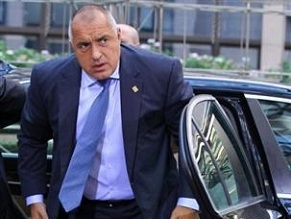|
World Jewish News

Bulgarian Prime Minister Boyko Borisov is heading for Brussels to take part in the two-day EU summit meeting.
|
EU summit in Brussels unlikely to discuss Bulgaria report showing Hezbollah's responsibility in Burgas bombing
07.02.2013, Israel and the World As EU heads of state or government meet Thursday in Brussels for a two-day summit, the European Union is under pressure from the US, Israel and Jewish groups to add Hezbollah to its list of terrorist organizations after one EU member state, Bulgaria, linked the Iranian-backed Lebanese Shiite group to a deadly bomb attack committed on its soil in July 2012.
Bulgarian Prime Minister Boyko Borisov, who is one of the 27 leaders to attend the Brussels meeting might use this opportunity to discuss the issue with his colleagues, although the topic is not at the agenda.
But the next meeting of EU Foreign Ministers, who generally discuss this issue, is set for February 18.
Israeli Prime Minister Benjamin Netanyahu on Wednesday night spoke on the phone with his Bulgarian counterpart and thanked him for the thorough and professional investigation into the 18 July 2012 terrorist bombing that killed five Israeli vacationers and the driver of a bus carried them to their hotel.
The Bulgarian findings show that two of the alleged perpetrators in the attack were members of Hezbollah.
"The findings of the investigation are clear and prove that Hezbollah was responsible for the atrocity in Burgas. This is an additional indication that Iran, through its proxies, is conducting a global terrorist campaign that crosses borders and continents. I hope that the Europeans will draw the necessary conclusions regarding the true character of Hezbollah after this criminal attack on European soil against an EU member state, » he said.
Until now, calls to blacklist Hezbollah in Europe have been resisted by countries like France, Sweden and even Germany.
But the Bulgarian report might change the EU position.
On Tuesday, EU foreign policy chief Catherine Ashton said the EU needed "to assess the implications of the investigation" and stressed that any decision on adding Hizbollah to the EU list of terrorist organisations would require a unanimous decision by the Foreign Ministers of the 27 EU countries.
According to Ashton’s spokeswoman, Maja Kocijancic, blacklisting Hezbollah is one of several options. "Currently Hezbollah is not on the list of terrorist organizations. As I said, the European Union will look into several options. This is one of them but not the only one," she told reporters.
"There are also actions that can be taken through various channels including, for example, through Europol, Eurojust, judicial action, political and diplomatic measures, and so on."
Europol is the EU's law enforcement agency, and Eurojust is its judicial cooperation unit.
Today, in Europe, only Britain and Holland label Hezbollah a terrorist organization, but London blacklists only the military wing of the Lebanese group.
Blacklisting the organization could allow regional authorities to clamp down on financial flows to the group and open the way for freezing assets linked to Hezbollah in Europe.
A French foreign ministry spokesman said various options were being considered. "We take note of the Bulgarian Interior Minister's declarations on the subject of the Burgas attack," a spokesman said. "We will draw conclusions from this in coordination with our European partners."
German Chancellor Angela Merkel's spokesman, Steffen Seibert, said if the Bulgarian evidence proves accurate "then consequences will have to follow" for Hezbollah.
On Tuesday, British Foreign Minister William Hague urged the EU to respond "robustly to an attack on European soil.”
The new US Secretary of State, John Kerry, called on Europe to cut off funding to Hezbollah.
"We strongly urge other governments around the world -- and particularly our partners in Europe -- to take immediate action to crack down on Hizbullah," he said.
"We need to send an unequivocal message to this terrorist group that it can no longer engage in despicable actions with impunity," he added.
Hezbollah has been on a US terror blacklist since 1995 after a series of anti-American attacks, including the bombing of the U.S. embassy and Marine barracks in Beirut in the 1980s.
In December, the US Senate passed a resolution calling on European countries to designate Hezbollah as a terrorist organization.
Kerry, who discussed the issue during talks Tuesday with Catherine Ashton, said the Bulgarian finding was "clear and unequivocal: Lebanese Hezbollah was responsible for this deadly assault on European soil."
by: Yossi Lempkowicz
EJP
|
|
